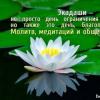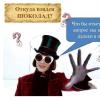KOTLYAREVSKY IVAN PETROVICH
Kotlyarevsky, Ivan Petrovich - a famous Little Russian writer (1769 - 1838). He graduated from the course at the Poltava Theological Seminary. He was a teacher in the homes of landowners; served in the military and took part in battles with the Turks. Since 1808, Kotlyarevsky lived in Poltava, in the position of an overseer at the institute for "educating the children of poor nobles." Kotlyarevsky is considered the father of the new Little Russian literature. His main work: "Virgil's Aeneid, transformed into the Little Russian language" is classic in its simplicity and elegance of style and Ukrainian irony. The first three songs of the Aeneid were published in 1798. Complete and accurate edition of Kotlyarevsky's "Aeneid", without changes in language, was made by Volokhinov in Kharkov, in 1842. The most widespread edition of Kulish (1862) presents major revisions of the text. When writing his Aeneid, Kotlyarevsky had in mind the Russian version of Osipov, published in 1791, and the latter, in turn, imitated the German writer Blumayer. Even earlier, Virgil's Aeneid underwent a satirical alteration in Italy (Eneide travestita, Lally, 1633) and in France (Virgile travesti en vers burlesques, Scarrona). Kotlyarevsky imitated Osipov in his choice of verse and in his depiction of drunkenness. Kotlyarevsky's independence is revealed in the language and in many original episodes, written with great talent. In 1819, Kotlyarevsky wrote two operettas: "Natalka-Poltavka" and "Moskal Charivnik", which until now occupy the first place in the Little Russian repertoire. "Natalka-Poltavka" was first published in 1837, "Moskal Charivnik" - in 1841. For the latter see the article by Professor Dashkevich in Kievskaya Starina (1893, XII). Kotlyarevsky here imitated the French operetta "Le soldat magicien" (1760). - Wed N.I. Petrov "Essays on the History of Ukrainian Literature" (22 - 36); N.P. Dashkevich, academic review of the previous book; N. M. V. (N. Minsky), in "Novi" (1885); Sergienko, in the II book of "Notes of the Shevchenko Science Association" (1893); Komarov "Showman" and "In memory of Kotlyarevsky" (Kiev, 1904).
Brief biographical encyclopedia. 2012
See also the interpretations, synonyms, meanings of the word and what is IVAN PETROVICH KOTLYAREVSKY in Russian in dictionaries, encyclopedias and reference books:
- KOTLYAREVSKY, IVAN PETROVICH
? famous Little Russian writer (1769-1838). His grandfather was a deacon in the Poltava cathedral church, his father served in the judicial department. 14 years old … - KOTLYAREVSKY IVAN PETROVICH
(1769-1838) Ukrainian writer. The ironic poem "Aeneid" (published 1798) contains pictures of the life of different strata of Ukrainian society; the play "Natalka Poltavka" (staged in 1819; ... - KOTLYAREVSKY IVAN PETROVICH in the Great Soviet Encyclopedia, TSB:
Ivan Petrovich, Ukrainian writer and cultural and public figure. He played an important role in the formation of a new ... - KOTLYAREVSKY IVAN PETROVICH
famous Little Russian writer (1769-1838). His grandfather was a deacon in the Poltava Cathedral Church, his father served in the judicial department. 14 years old he ... - IVAN in the Thieves Jargon Dictionary:
- the pseudonym of the leader of the notorious ... - IVAN in the Dictionary of the Meanings of Gypsy Names:
, Johann (borrowed., Husband.) - "God's mercy" ... - KOTLYAREVSKY in 1000 biographies of famous people:
Sergei Andreevich (born in 1873) is a historian and lawyer, author of works on the history of the West and state law. In their own ... - PETROVICH in the Literary Encyclopedia:
Velko is a prominent contemporary Serbian novelist and poet. He took an active part in the national movement in Hungarian Serbia, edited a number of ... - KOTLYAREVSKY in the Literary Encyclopedia:
1. Ivan Petrovich - the famous Ukrainian writer, the pioneer of new Ukrainian literature. The son of a petty clerk, Kotlyarevsky was brought up at the Poltava Seminary, ... - PETROVICH in the Big Encyclopedic Dictionary:
(Petrovici) Emil (1899-1968) Romanian linguist. Works on dialectology, linguistic geography, history, onomastics, phonetics and phonology of the Romanian language and Slavic ... - IVAN in the Big Encyclopedic Dictionary:
V (1666-96) Russian Tsar (from 1682), son of Tsar Alexei Mikhailovich. Painful and incapable of state activities, he was proclaimed tsar along with ... - PETROVICH in the Encyclopedic Dictionary of Brockhaus and Euphron:
(Petrovics) is the real name of the Hungarian (Magyar) poet Petafi ... - IVAN in the Encyclopedic Dictionary of Brockhaus and Euphron:
cm. … - IVAN in the Modern Encyclopedic Dictionary:
- IVAN in the Encyclopedic Dictionary:
I Kalita (until 1296 - 1340), Prince of Moscow (from 1325) and grand Duke Vladimirsky (1328 - 31, from 1332). Son … - IVAN in the Encyclopedic Dictionary:
-DA-MARYA, ivan-da-Marya, f. Herbaceous plant with yellow flowers and purple leaves. -TEA, Ivan-Chai, M. Large herbaceous plant this fireweed with ... - PETROVICH
PETROVICH (Petrovici) Emil (1899-1968), room. linguist. Tr. in dialectology, ling. geography, history, onomastics, phonetics and phonology room. lang., in the area ... - KOTLYAREVSKY in the Big Russian Encyclopedic Dictionary:
KOTLYAREVSKY Ser. Andes. (1873-1940), polit. activist, historian. One of the founders of the "Union of Liberation", "Union of Zemstvo Constitutionalists", the Cadet Party (member of its Central Committee with ... - KOTLYAREVSKY in the Big Russian Encyclopedic Dictionary:
KOTLYAREVSKY Peter Step. (1782-1851), dew. General of Infantry (1826). In Russian-Pers. war 1804-13 won victories on the river. Araks (1810), at ... - KOTLYAREVSKY in the Big Russian Encyclopedic Dictionary:
KOTLYAREVSKY Nestor Al-dr. (1863-1925), literary critic, acad. Petersburg. AN (1909) and RAS (1917). Close to cultural history. school. Tr. about sentimentalism and ... - KOTLYAREVSKY in the Big Russian Encyclopedic Dictionary:
KOTLYAREVSKY Yves. Peter. (1769-1838), ukr. writer. In heroicomich. the poem "Aeneid" (published in 1798, completely in 1842) - pictures of the life of different ... - IVAN in the Big Russian Encyclopedic Dictionary:
IVAN CHERNY, scribe at the court of Ivan III, religious freethinker, part. F. Kuritsyn's mug. OK. 1490 fled for ... - IVAN in the Big Russian Encyclopedic Dictionary:
IVAN FYODOROV (c. 1510-83), founder of book printing in Russia and Ukraine, educator. In 1564 in Moscow joint. with Peter Timofeevich Mstislavets ... - IVAN in the Big Russian Encyclopedic Dictionary:
IVAN PODKOVA (? -1578), mold. lord, one of the hands. Zaporozhye Cossacks. He declared himself the brother of Ivan the Fierce, in 1577 he captured Iasi and ... - IVAN in the Big Russian Encyclopedic Dictionary:
IVAN LYUTY (Grozny) (? -1574), mold. sovereign from 1571. Pursued a policy of centralization, headed the liberation. the war against the tour. yoke; as a result of treason ... - IVAN in the Big Russian Encyclopedic Dictionary:
IVAN IVANOVICH YOUNG (1458-90), son of Ivan III, co-regent of his father from 1471. Was one of the hands. Russian troops during "standing ... - IVAN in the Big Russian Encyclopedic Dictionary:
IVAN IVANOVICH (1554-81), the eldest son of Ivan IV the Terrible. Member of the Livonian War and the oprichnina. Killed by his father during a quarrel. This event … - IVAN in the Big Russian Encyclopedic Dictionary:
IVAN IVANOVICH (1496 - c. 1534), the last great. Prince of Ryazan (from 1500, actually from 1516). In 1520 planted by Vasily III ... - IVAN in the Big Russian Encyclopedic Dictionary:
IVAN ASEN II, bulg. king in 1218-41. He defeated the army of the Epirus despot at Klokotnitsa (1230). Significantly expanded the territory. Second Bolg. kingdoms, ... - IVAN in the Big Russian Encyclopedic Dictionary:
IVAN ALEXANDER, bulg. king in 1331-71, from the Shishmanovich dynasty. With him, the Second Bolg. the kingdom fell into 3 parts (Dobrudzha, Vidinskoe ... - IVAN in the Big Russian Encyclopedic Dictionary:
IV'AN VI (1740-64), Russian. Emperor (1740-41), great-grandson of Ivan V, son of Duke Anton Ulrich of Braunschweig. E.I. ruled for the baby. Biron, then ... - IVAN in the Big Russian Encyclopedic Dictionary:
IVAN V (1666-96), Russian. Tsar since 1682, son of Tsar Alexei Mikhailovich. Painful and incapable of state. activity, proclaimed king ... - IVAN in the Big Russian Encyclopedic Dictionary:
IVAN IV the Terrible (1530-84), grand. Prince of Moscow and "All Russia" from 1533, the first Russian. tsar since 1547, from the Rurik dynasty. ... - IVAN in the Big Russian Encyclopedic Dictionary:
IVAN III (1440-1505), grand. Prince of Vladimir and Moscow from 1462, "Sovereign of All Russia" from 1478. Son of Vasily II. Married to ... - IVAN in the Big Russian Encyclopedic Dictionary:
IVAN II Red (1326-59), grand. Prince of Vladimir and Moscow since 1354. Son of Ivan I Kalita, brother of Semyon the Proud. In 1340-53 ... - IVAN in the Big Russian Encyclopedic Dictionary:
IVAN I Kalita (up to 1296-1340), grand. prince of Moscow from 1325, led. Prince of Vladimir in 1328-31 and from 1332. Son of Daniel ... - PETROVICH in the Encyclopedia of Brockhaus and Efron:
(Petrovics)? the real name of the Hungarian (Magyar) poet Petafi ... - IVAN
A tsar who changes his profession in ... - IVAN in the Dictionary for solving and compiling scanwords:
Boyfriend ... - IVAN in the Dictionary for solving and compiling scanwords:
A fool, but in his fairy tales everything is on princesses ... - IVAN in the dictionary of Russian Synonyms:
name, ... - IVAN in the Dictionary of the Russian language Lopatin:
Iv`an, -a (name; about a Russian person; Iv`any, not remembering ... - IVAN
Ivan Ivanovich, … - IVAN in the Complete Russian Spelling Dictionary:
Ivan, -a (name; about a Russian person; Ivans, not remembering ... - IVAN in the Dahl Dictionary:
the most common name we have (Ivanov, that filthy mushrooms, altered from John (of which there are 62 in the year), throughout the Asian and ... - PETROVICH
(Petrovici) Emil (1899-1968), Romanian linguist. Works on dialectology, linguistic geography, history, onomastics, phonetics and phonology of the Romanian language and Slavic ... - KOTLYAREVSKY in the Modern Explanatory Dictionary, TSB:
Ivan Petrovich (1769-1838), Ukrainian writer. The ironic poem “Aeneid” (published 1798) contains pictures of the life of different strata of Ukrainian society; play "Natalka ... - IVAN at Explanatory dictionary Russian language Ushakov:
Kupala and Ivan Kupalo (I and K capital letters), Ivan Kupala (Kupala), pl. no, m. The Orthodox have a holiday on June 24 ...
Ivan Petrovich Kotlyarevsky - Ukrainian writer, author of "Aeneid", the first literary work in the spoken Ukrainian language of that time. One of the ideologues of the Enlightenment in Ukraine.
Biography
In 1816-1821 - director of the Poltava Theater. In 1818, together with V. Lukashevich, V. Tarnavsky and others, he was a member of the Poltava Masonic Lodge "Love for Truth". Kotlyarevsky assisted in the redemption of M.S.Schepkin from serfdom. B - is the trustee of charitable institutions.
Literary activity
He began his literary career around 1794. Kotlyarevsky is the author of The Aeneid (3 parts; - full posthumous edition), which was reprinted several times under the title of Virgil's Aeneid. Revised into Little Russian language by I. Kotlyarevsky. Taking as a basis the plot of the eponymous poem by Virgil, as well as the parody poem of the same name by Nikolai Osipov in Russian (where Aeneas is depicted as a Russian "daring fellow"), Kotlyarevsky created his original work of art in the tradition of burlesque. In the poem, the author recreated different aspects of the life of Ukrainian society in the second half of the 18th century. National coloring and sympathy for the fate of the common people determined the great success of the Aeneid among its contemporaries.
Under the influence of the Aeneid, which had great success among the Ukrainian and Russian public, the “Urainian language” was perceived for a long time (including by many Ukrainian writers) as closely associated with burlesque themes and “low calm”. Kotlyarevsky himself and his contemporaries viewed "Ukrainian" literature as a regional addition to Russian, not claiming an equal status or multifunctionality with it, and used the "Ukrainian language" as such primarily for a humorous purpose. Therefore, the writers of Ukrainian romanticism, who since the 1840s had been establishing the Ukrainian language in a wider stylistic and thematic range, tried to dissociate themselves from the traditions of Kotlyarevsky - "Kotlyarevschina". Taras Shevchenko, who in 1838 wrote enthusiastic poems for the death of the poet "To the eternal memory of Kotlyarevsky", in which he glorified him as the creator of the immortal "Aeneid", in 1847 certified the "Aeneid" as "smіkhovina on the Moscow stalt".
In 1861, a well-known writer and public figure, Shevchenko's friend Panteleimon Kulish called Kotlyarevsky an exponent of "anti-popular samples of taste" who made fun of the "Ukrainian nationality" in his "Aeneid", parading "everything that the caricatured, funny and absurd in the worst examples of a commoner ", and called the language of the poem" an example of Ukrainian tavern conversation. " (Kulish P. A. Review of Ukrainian literature // Osnova. 1861. No. 1. P. 244, 246. 247.)
Based on the poem, the operas Aeneas in the Wanderings (composer Ya. E. Lopatinsky) and Aeneid (composer H. Lysenko, libretto by G. Sadovsky) were created.
List of works
- magazine "Poltava Fly"
- "[Aeneid (Kotlyarevsky) | Virgilieva Aeneid, transformed into Little Russian by Ivan Kotlyarevsky]" (known simply as "Aeneid")
- "Song for the new year 1805 to our master and father Prince Alexei Borisovich Kurakin"
- Notes on the first actions of the Russian troops in the Turkish war of 1806
- "The soldier-sorcerer" (vaudeville)
- "Natalka Poltavka" (play)
- "Little Russian Provincial General Choir" (cantata)
- "Oda Sappho" (Russian translation)
- "Reflections on the Gospel of Luke, translated from the French work of Abbot Duquesne"
The modern Ukrainian language might not have existed if it had not been for Ivan Kotlyarevsky, who wrote the amazing humorous poem "Aeneid". Thanks to this work, the living language of the Ukrainian people was finally transferred to the pages of books. However, not only this attracted the readers of "Aeneid", but also with a fun, exciting plot and bright, well-written characters.
Ivan Kotlyarevsky: a short biography
Ivan Petrovich Kotlyarevsky was born in Poltava, in the family of a clerical official, in September 1769.
When the young man turned eleven, he was sent to study at a theological seminary. After his studies, Ivan Kotlyarevsky, in order to earn his living, gave private lessons to the offspring of the local petty nobility. A little later, he got a job in the Poltava chancellery and worked there for about four years.
During the Russian-Turkish war, Kotlyarevsky actively participated in the siege of Izmail and was even awarded an honorary order. After the end of the war, he retired and returned to Poltava.
When Ivan Petrovich passed over thirty, he got a job as a superintendent in one of the Poltava educational institutions for children from impoverished noble families who were unable to pay for education in high schools worthy of their position.
During the French-Russian war of 1812, Kotlyarevsky actively participated in the defense of Poltava, having obtained permission to organize a Cossack regiment by local youth.
After the war he became interested in theater. In 1816 he became director of the free theater of Poltava. Due to the lack of a decent repertoire, he took up writing himself. So from under his pen came out two plays: "Natalka-Poltavka" and "Moskal-Charivnik".
At the age of 69, Kotlyarevsky died. Buried in Poltava.
The history of writing "Aeneid"
Even during his military service, Ivan Petrovich had the idea to write a poem about the Cossacks. Knowing quite well classical literature, and also possessing the talent to rhyme perfectly, he decided to create on the basis of the plot of the Aeneid by the ancient Roman poet Virgil own composition Kotlyarevsky.
Virgil's Aeneid had already been translated into Russian in a rather loose style by the Russian writer Nikolai Osipov a few years earlier, which inspired Kotlyarevsky. However, Ivan Petrovich turned the main character Aeneas into a Cossack, and wrote the poem itself in ordinary colloquial speech, which no one had done in Ukrainian literature before him.
In 1798, the first three parts of the poem were published in St. Petersburg.

"Aeneid" by Kotlyarevsky instantly gained popularity: not only its plot, but also the piquant humor with which the poet generously supplied his work, attracted readers. In addition, written in Ukrainian, it was exotic for the Russian-speaking population of the country.
"Aeneid": a summary of the first, second and third parts
In the first part, the brave Cossack Aeneas, after the destruction of his native Troy, on the advice of his mother, the goddess Venus (his late father once helped her win a dispute with other goddesses), goes with the Trojans to new lands to establish his kingdom there.

However, Juno, who hates the family of Aeneas (she was among the losers trying to mend all sorts of dirty tricks to the hero. But Venus, having complained, learns that Aeneas has a great destiny - he will become the founder of a great kingdom.
Meanwhile, Aeneas and his companions arrive in Carthage, where Queen Dido falls in love with the brave Cossack. In her arms, the hero forgets about everything: both the sad past and the great future. Then Zeus sends Mercury to him, which forces Aeneas to leave his beloved. Dido, not enduring such a betrayal, commits suicide.
In the second part, Juno tricks the Trojan women into burning ships while the men feast in Sicily. However, the gods send rain at the request of Aeneas, and some of the ships remain intact. Soon, in a dream, his late father Anchises comes to Aeneas and asked to visit him in hell.
In the third part, Aeneas, after a long search and with the help of the Sibyl, finds the way to hell. After seeing the horrors of the underworld and meeting there the souls of dead countrymen, as well as Dido and his father, the hero with expensive gifts and auspicious prophecies sets off again on the road.
Summary of the fourth, fifth and sixth parts of the "Aeneid" (written much later)
In the fourth part, Aeneas sails to the island of King Latina. Here he makes friends with him, and he plans to pass off his beautiful daughter Lavinia as a pleasant new neighbor. However, the girl's ex-fiancé - King Thurn -, with the assistance of the omnipresent Juno, begins a war against Latina. Meanwhile, the insidious goddess cunningly turns his wife Latina against the Trojans, and they all prepare for war.

In the fifth part, Venus persuades him to make a magnificent weapon for Aeneas. To win the war, the Trojans ask for help from the neighboring people. Juno warns Thurn about the time of the start of Aeneas' attack. And two Trojan warriors - Niz and Euryal - secretly sneak into the enemy camp and kill many opponents, while dying themselves. Soon, the Trojans manage to put Thurn to flight.
In the last part of the poem, Zeus learns about the tricks of all the gods and forbids them to interfere in the fate of Aeneas. However, Juno, having come to her husband Zeus, gave him a drink and put him to sleep. And then, with the help of cunning, she saved Thurn from death. Aeneas negotiates with Thurn and Latin about a fair fight, which should determine the outcome of the war. Juno is trying with all her might to destroy Aeneas, but Zeus catches her and forbids her to interfere, adding that after her death, Aeneas will be with them on Olympus. Aeneas honestly defeats Thurn and, after some hesitation, kills him.
Aeneid characters
The main character of the poem is the son of Venus and the king of Troy Ankhiz - Aeneas. He is a brave Cossack, a brave, resolute and skillful warrior, but human weaknesses are not alien to him. So, Aeneas is not averse to drinking and taking a walk with friends.

He is also greedy for female beauty. Having started an affair with Queen Dido, Aeneas forgets about everything. But later he easily abandons her by the order of the gods. Despite all his shortcomings, when necessary, Aeneas is able to show both diplomacy and resourcefulness. It is around this hero that the entire Aeneid poem is built.
The rest of the characters in the poem are not so bright. So, the classic woman is embodied in the image of Dido.

She is smart, cheerful and hardworking, but, being a widow, she dreams of a strong male shoulder. Having seized the heart of Aeneas, the queen began to behave like a spouse in comedies: she was jealous and quarreled with him.
The Kings of Latin and Thurn have opposite personalities. The first is greedy and cowardly, trying to avoid war with all his might. The second, on the contrary, is bold, pompous and arrogant. Because of this bombast, Juno manages to use him with ease.
Of particular interest is the character of Latina's wife, Queen Amata. A woman matched by Turnu is just as proud and pompous. But at the same time, she is incredibly smart and cunning. However, like Dido, having fallen in love, he begins to do stupid things.
Notable are the characters of two Trojan Cossacks - Niza and Euryale. Having sacrificed their lives, they destroyed many enemies.

It is quite possible that Kotlyarevsky used his memories of the Russian-Turkish war when creating these images.
"Aeneid" is inconceivable without the main characters, the gods. The first of their host is the supreme goddess of Olympus Juno - the main opponent of Aeneas.

She hates the protagonist with all her heart, dreaming of limiting him. To achieve her goal, Juno is ready for anything and does not even stop at the direct prohibition of her husband. However, despite all her tricks, the prophecy about Aeneas comes true.
Another heroine-goddess of the Aeneid is Venus. Being rather dissolute, the goddess behaves like a real caring mother. She goes to great lengths to help her Aeneas: she opposes Juno, seduces Vulcan and even sometimes argues with Zeus.
Zeus in The Aeneid is depicted as a traditional boss - he loves to drink and relax. Despite all his warnings, the goddesses rarely listen to him, trying to achieve their own by roundabout ways, with the help of bribes and connections.
Translation of "Aeneid" into Russian
Today, there is a lot of controversy over the language in which Kotlyarevsky's "Aeneid" was written. So, some people mistakenly believe that Ivan Petrovich first wrote his poem in Russian, and later made a translation. The Aeneid, however, was actually written in Ukrainian (Little Russian, as they said at the time), however, since it did not yet have a separate alphabet, the author used the letters of Russian.
But the full translation of Kotlyarevsky's Aeneid into Russian was carried out by I. Brazhnin.
By the way, do not confuse Osipov's work with the one written by Kotlyarevsky. "Aeneid" for each of the authors is a separate, independent work. However, when writing, both Osipov and Kotlyarevsky used the poem of Virgil as the primary source.
Years have passed, many words, phenomena, things and events mentioned in the "Aeneid" have lost their relevance, or even completely sunk into oblivion, so modern readers do not understand everything from what Kotlyarevsky described in his poem. "Aeneid" now seems to them just a cheerful poem with old curses. But at the same time, even today she remains beloved by all Ukrainians, and not only by them.
Kotlyarevsky Ivan Petrovich was born on September 9, 1769 in Poltava, died in the same city on November 10, 1838. Ukrainian poet, playwright, public figure, pioneer of a new era of Ukrainian literature.
The main merit and achievement of Ivan Kotlyarevsky.
Thesis of Russian propaganda 2014-2015 about the fact that there is no Ukrainian nation (there is a "pollinated dialect" of the Russian language, and "Ukrainians" are "Little Russians") was refuted at the end of the 18th century, when in 1798 the first three parts of Kotlyarevsky's "Aeneid" with an extensive , for more than 1000 words, a Ukrainian-Russian glossary.
The presence of a literary language is an attribute of a nation. So, more than 200 years ago, thanks to the literary feat of Ivan Kotlyarevsky, all the philologists of the world learned and recognized the Ukrainian language, into which Virgil's Aeneid can be translated, as the ancient Greek plot was previously presented in French (P. Scarron), German (A. Blumauer) and a number of other languages \u200b\u200bof the world.
The theme of the genre is not accidental from the point of view of philology. The literature of any country in its birth goes through 3 stages - at first it laughs, then cries and only then loudly declares itself. The birth process in Ukrainian literature was started by Kotlyarevsky, picked up by Kvitka-Osnovyanenko, the culmination was the work of Taras Shevchenko.
- "Aeneid" by Kotlyarevsky once became a source of healing laughter, which brought the Ukrainian nation back to life in the most difficult period for it. The writer proved that the Ukrainian language, considered a folk dialect, is ideal for writing serious literary works;

The Aeneid, written by Kotlyarevsky, became a turning point not only in literature, but also in the history of the people as such; it revived the Ukrainian language after many years of attempts to stifle the voice of the people;
In a very difficult historical period for Ukrainians, the writer gave the nation the strength for revival, drawing inspiration from the people themselves, their way of life and the brilliant facets of individuality;

For a nation, laughter means recovery and access to new level self-awareness. At the turn of the 17-18 centuries "Aeneid" returned to the Ukrainians the strength to fight for existence when almost no one believed in the revival of the nation after the destruction of the Hetmanate and the Zaporizhzhya Sich;

The main hero of Kotlyarevsky's poem is the Ukrainian people. In the text, he appears before the readers as a truly heroic nation. Strength to the Cossacks is given by their love for the Motherland, which turns an ordinary young guy into a heroic knight;

The work of Kotlyarevsky revived the Ukrainian language, which was diligently destroyed during the 2nd half of the 17th and 1st half of the 18th century.
Literary critics claim that Kotlyarevsky's "Aeneid" is written in a super-airtight style; only a person who knows Ukrainian history well can unpack the "container". The writer Yevgeny Sverstiuk once said that in the Aeneid, besides the text itself, there is also subtext and supertext.

In his most famous work, Kotlyarevsky dressed Virgil's heroes in Ukrainian clothes. As a result, it turned out that the Ukrainian people understood the real meaning of the poem, and the imperial authorities did not see the danger to themselves in the "Aeneid". The work is often called "the history of Ukraine in time, sailing by sea waves".

Kotlyarevsky, in the image of his Aeneas, portrayed the collective image of the Ukrainian Cossack, in Tourna the attentive reader can easily guess the Moscow tsar, and in Troy - the Ukrainian state, which in its development is constantly faced with opposition. The Aeneid is often called the encyclopedia of Ukrainian life. The intellectual Kotlyarevsky gained knowledge by going to the people. The writer dressed in inconspicuous peasant clothes and plunged into the world of the common people.

Collective images are also present in his dramatic works. In the play "Natalka-Poltavka" the writer described the ideal Ukrainian woman who knows how to love with all her heart. In the image of Voznoy, the playwright showed that even in everyday life there is a place for feat, and it is easy and simple to give happiness to a loved one. In 1889, the legendary Ukrainian composer Nikolai Lysenko wrote an opera based on the play "Natalka-Poltavka", the work was translated into many languages, and to this day theatrical performances are staged on it.

It is not difficult to find a collective image, this time negative, in the work "Moskal the Charivnik", written by Kotlyarevsky in 1819. If in "Aeneid" satire is veiled, then in the play the shortcomings of the supporters of royal oppression are demonstrated much more clearly. Critics call the play a bold, daring satire on the Moscow authorities.
It is noteworthy that the Aeneid was published in print in stages. First, without informing the writer, in 1798 the publisher Mikhail Parpura in St. Petersburg published the first 3 sections of the poem. The publisher made good profits, the writer fame. The lack of reaction to the risky satirical work showed that the imperial leadership of the essence of "Aeneid" did not understand what inspired the writer to continue.
The full text was published only after the death of the author, in 1842. Kotlyarevsky worked on the poem almost all his life, starting while studying at the theological seminary. The final version of the text consists of 730 stanzas, 10 lines each.
Literary critics state that the consciousness and work of Kotlyarevsky contain signs of baroque and romanticism. However, the writer understood the baroque in his own way, he showed that ordinary inhabitants of the Ukrainian village can also be great. The writer became the author of the first serious work in the popular language, before that he was considered an adverb that is suitable only for writing interludes.
Biography of Ivan Kotlyarevsky.
Born on September 9, 1769 in Poltava in the family of the Cossack-elders' clan, which belonged to the elite of the Gemanshchyna;
From 1780 to 1789 he studied at the seminary of Poltava, where he mastered several foreign languages. He refused to continue his studies in St. Petersburg, having entered the service of a clerk after graduating from the seminary;
From 1793 to 1796 he worked as a teacher in the families of rural landowners;
In 1796-1808 he did military service, took part in the battles near Izmail and Bender as part of the Russian-Turkish war;
Since 1810 he was a patron in the Poltava house for the children of poor nobles;
In 1812, he was engaged in the formation of the 5th Ukrainian Cossack regiment for the participation of the unit in the war against Napoleon I Bonaparte. The writer was promised that after the end of the war the regiment would be saved as a permanent Cossack army, but Kotlyarevsky's idea was never successful;
In 1816-1821 he served as director of the Poltava Theater, enriched the repertoire with his own dramatic works;
From 1827 to 1835 he worked as a trustee of charitable institutions in Poltava;
The founder of Ukrainian literature, judging by the stories of contemporaries that have come down through the centuries, was an interesting person in communication, with a brilliant sense of humor. People who knew Kotlyarevsky said that he could talk about ordinary things in a very funny way, but he himself did not even smile.
The poet's lifestyle is often compared with the fate of Grigory Skovoroda. Both iconic writers for Ukraine are all possible ways tried to avoid contact with the authorities. However, if Skovoroda is often called the first Ukrainian wandering philosopher, then Kotlyarevsky lived his entire life in his native Poltava.
Kotlyarevsky, who created in his Natalka-Poltavka the image of an ideal, loving Ukrainian woman, never married. Literary critics give 2 possible versions of the fact that a promising groom in all respects did not become someone's spouse. Some suggest that unhappy love could have taken place even during their studies at the theological seminary.
According to another version, the heart of the writer was taken by a certain Maria Semyonovna, who raised 7 children of the landowner at the time when Kotlyarevsky worked as a teacher in the families of wealthy landowners. There is evidence that the hand of the poet's beloved woman was promised to another man, and immediately after the wedding of the lady of the heart, the writer went to the army, where he spent 14 years.
At one time, Kotlyarevsky was a member of the Poltava Masonic Lodge "Love for Truth", enjoyed authority in the city. By using his own connections, the writer contributed to the ransom from slavery of Mikhail Semenovich Shchepkin, who is not only the founder of the Russian acting school, but also the best performer of the main role in the play "Moskal-Charivnik".

The "Aeneid" autographed by Kotlyarevsky was carefully preserved by Emperor Alexander I. A copy of the work was also in the personal library of Napoleon I Bonaparte in his home after being exiled to St. Helena.
The writer also distinguished himself during his work as a trustee of charitable institutions. Among the trustees, corruption was quite common, which in the activities of Kotlyarevsky, crystal honest man, was not observed. As a result, for 1 year of work, he saved 2,400 ducats.
Before his death, Kotlyarevsky distributed his own property to relatives and friends, and freed the slaves. The monument on the grave of the poet was erected by his friend, Pavel Steblin-Kamensky. The words written by Taras Shevchenko are carved on the tombstone.


Perpetuation of the memory of Kotlyarevsky.
In 1952, the Kotlyarevsky Literary Memorial Museum was opened in Poltava;

In 1969, on Ivanova Gora in Poltava, a museum-estate was opened in the house where the writer was born and lived;

The name of Kotlyarevsky is immortalized in the names of streets of different cities of Ukraine, in Poltava and Kiev parks bear the name of the poet. Many educational institutions, libraries and even cinemas are named after an outstanding writer;
On October 28, 1998, the National Bank of Ukraine issued a commemorative gold coin with a denomination of 100 hryvnia as part of the "Spiritual Treasures of Ukraine" series in honor of the 200th anniversary of the first edition of "Aeneid";

In September 2009, in the series "Outstanding Personalities of Ukraine", a silver 5 hryvnia coin was issued, dedicated to Ivan Kotlyarevsky;


The monument to the poet was erected near the Ukrainian Catholic University of St. Clement in Rome;
A plaster-concrete bust made by sculptor Galina Kalchenko was installed on the territory of the estate museum in 1971. This woman also made a bust monument in Kiev, erected in 1973;


In 2004, a bas-relief was installed by Kotlyarevsky and "Aeneid" in the monument to the chroniclers of Rus-Ukraine in the city of Chernivtsi;

In 2010, a monument to the writer was erected on the territory of the military-historical complex "Bendery Fortress" in the city of Bendery (Transnistria);

In 1969 and 1994, postage stamps dedicated to Kotlyarevsky were issued;


Since 2007, the regional prize named after Kotlyarevsky has been awarded in Poltava;
Since 1990, the Kotlyarevsky Prize has been awarded annually for achievements in the field of drama and theatrical art. The laureates are selected by representatives of the Ministry of Culture, the Union of Writers of Ukraine and the Union of Theater Workers of Ukraine.
_____________________
* If you find an inaccuracy or error, please inform [email protected]website .
** If you have materials about other heroes of Ukraine, please send them to this mailbox
Ivan Petrovich Kotlyarevsky - Ukrainian writer, author of "Aeneid", the first literary work in the spoken Ukrainian language of that time. One of the ideologues of the Enlightenment in Ukraine.
Biography
In 1816-1821 - director of the Poltava Theater. In 1818, together with V. Lukashevich, V. Tarnavsky and others, he was a member of the Poltava Masonic Lodge "Love for Truth". Kotlyarevsky assisted in the redemption of M.S.Schepkin from serfdom. B - is the trustee of charitable institutions.
Literary activity
He began his literary career around 1794. Kotlyarevsky is the author of The Aeneid (3 parts; - full posthumous edition), which was reprinted several times under the title of Virgil's Aeneid. Revised into Little Russian language by I. Kotlyarevsky. Taking as a basis the plot of the eponymous poem by Virgil, as well as the parody poem of the same name by Nikolai Osipov in Russian (where Aeneas is depicted as a Russian "daring fellow"), Kotlyarevsky created his original work of art in the tradition of burlesque. In the poem, the author recreated different aspects of the life of Ukrainian society in the second half of the 18th century. National coloring and sympathy for the fate of the common people determined the great success of the Aeneid among its contemporaries.
Influenced by the Aeneid, which had great success among the Ukrainian and Russian public, the “Urainian language” was perceived for a long time (including by many Ukrainian writers) as closely associated with burlesque themes and “low calm”. Kotlyarevsky himself and his contemporaries viewed “Ukrainian” literature as a regional addition to Russian, not claiming an equal status or multifunctionality with it, and used the “Ukrainian language” as such primarily for a humorous purpose. Therefore, the writers of Ukrainian romanticism, who since the 1840s had been establishing the Ukrainian language in a wider stylistic and thematic range, tried to dissociate themselves from the traditions of Kotlyarevsky - "Kotlyarevschina". Taras Shevchenko, who in 1838 wrote enthusiastic poems “To the eternal memory of Kotlyarevsky” for the death of the poet, in which he glorified him as the creator of the immortal “Aeneid”, in 1847 certified the “Aeneid” as “smіkhovina on the Moscow stalt”.
In 1861, a well-known writer and public figure, Shevchenko's friend Panteleimon Kulish called Kotlyarevsky an exponent of "anti-popular samples of taste" who made fun of the "Ukrainian nationality" in his "Aeneid", parading "everything that the caricatured, funny and absurd in the worst examples of a commoner ", and called the language of the poem" an example of Ukrainian tavern conversation. " (Kulish P. A. Review of Ukrainian literature // Osnova. 1861. No. 1. P. 244, 246. 247.)
Based on the poem, the operas Aeneas in the Wanderings (composer Ya. E. Lopatinsky) and Aeneid (composer H. Lysenko, libretto by G. Sadovsky) were created.
List of works
- magazine "Poltava Fly"
- "[Aeneid (Kotlyarevsky) | Virgilieva Aeneid, transformed into Little Russian by Ivan Kotlyarevsky]" (known simply as "Aeneid")
- "Song for the new year 1805 to our master and father Prince Alexei Borisovich Kurakin"
- Notes on the first actions of the Russian troops in the Turkish war of 1806
- "The soldier-sorcerer" (vaudeville)
- "Natalka Poltavka" (play)
- "Little Russian Provincial General Choir" (cantata)
- "Oda Sappho" (Russian translation)
- "Reflections on the Gospel of Luke, translated from the French work of Abbot Duquesne"














